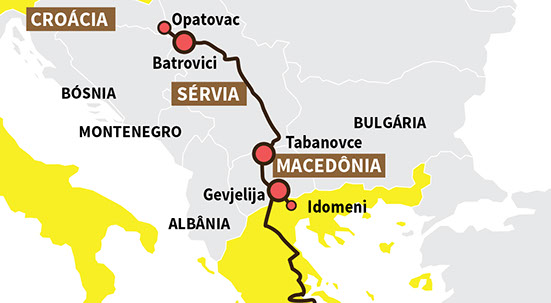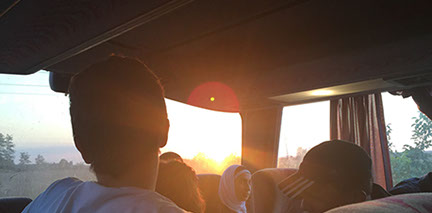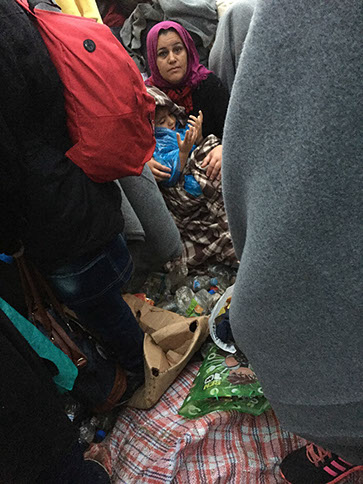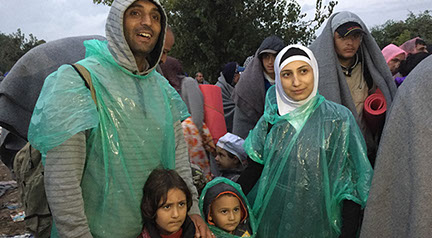Protected by rain
On the border between Serbia and Croatia, a line of police officers is concealed by the crowd. Twenty steps separate the migrants from the other side. Fifteen hours elapse.

Unawareness is the keynote of the trip. No one knows how long the next walk should take, how long they will have to wait. It takes trust. And waiting. They wait without complaining. Being outdoors here is safer than being at home in Syria.
At the Serbian side of the border, a volunteer holds a placard with instructions in Arabic, and some stop to take pictures with her. The slender blonde attracts looks not only because of her friendliness but also because of her figure.
“Women here are so sexy.” Ammar says, excitedly.
Razan picks a children's clothing kit and changes Mohammad's clothes. She throws away his soiled pants. There is no way to wash them.
At dusk, the crowd is so big that it becomes impossible to see the border, where police officers patrol the area. From time to time, the people at the front whistle and clap their hands, celebrating whenever someone moves to the other side.
Volunteers are surrounded by refugees looking for information.
"We can't be sure how long you will have to wait. The gates are opened and closed from time to time. Few people are going in when they open the gates.” says one of the volunteers, who estimates at least a thousand people still waiting.
From a distance, we hear the chorus of a song.
“It's a Syrian song. They are singing that they are going to miss their country” explains Mohamed.
At 8:30 pm, we set camp on the gravel, sitting on our backpacks.
Thirty minutes later, the line begins to move.
“Yeaah!” the people at the front celebrate in unison.
They all rise. There is movement in the crowd, but no stampede. The group cares more about staying together. It will be an evening of advances and setbacks, as one sits and stands up in an anxious and hesitating manner. Parents rest with children in their arms and a dull, distant look in their eyes. Since the line is not moving, the family lays the blankets gifted by volunteers on the ground. Bumps form on the covers, courtesy of a pile of empty plastic bottles and biscuit packages lying on the ground, traces left by the migrants who have been here before. The irregular bed is all the comfort that is available for children and adults who need some sleep. Musa saves a small space for me under the blanket and I lay my head on my backpack — an unlikely bed under the stars. Thirty minutes later, there's a new warning about the line moving. Members of the group start arguing. Some think it's better to run and get a better position. The parents worry about their sleeping children, and would rather remain under the blankets. It becomes difficult to keep the group together in the midst of an argument.
TV crews circulate among the people, casting flashes of light in the darkness.
In the middle of the night, a volunteer in an orange vest hands out water bottles. The people at the front try to pressure the police to open up the gates.
“Open! Open!”
But it doesn't help.
I fall asleep. The people in the group cover me with a blanket. I don't feel in a position to refuse: I sleep warm, feeling privileged. When I think about standing up, two young men from the group are sleeping on my legs.
Around 1 am, Ghazi starts waking everybody up.
“Come on, Come on!”
They lose valuable minutes until they manage to break camp. The group moves forward a little in the line and then stops again. The uncle of the children, Adham — who was hoping to get a better place —has been several days without a proper night of sleep and becomes restless.
"You people slept. I didn’t."
The group members walk holding hands to avoid getting lost. We stand up, in the expectation that the line will move, but after 40 minutes we are still on the same spot. Ghazi asks the UNHCR volunteers, who wear blue vests, if they'll open up the border. But It doesn’t seem like they have listened.
In the middle of the night, volunteers wearing yellow vests throw biscuits to migrants, unable to move around in the crowd.
At dawn, the weather cools down, and the blankets become a protection against the elements over their heads.
“They look like zombies. I saw a film.” says the Iraqi, who learned English by himself watching American movies.
Mohamed has an uncle that lives in the United States, where he dreams of going after he arrives in Germany. The marathon runner is a fan of Kim Kardashian and follows her on Instagram. He admits that he's not from one of the areas of Iraq affected by the war, but says his uncle encouraged him to make use of the migratory wave.
At 5:30 am, it starts to rain. The Police are still on the border. At least 20 policemen are lined up with arms crossed, standing in front of us. Raincoats thrown by volunteers keep the situation from getting worse. We put on the green plastic raincoats over our backpacks, and the damp blankets are left on the ground, one by one. The same ground that turned into a sea of plastic bottles, where we can make out several other objects that tell the story of a trip: a diaper, a teddy bear. Filth is a bleak, symbolic picture of this journey.
“We became dirty people. Fucking dirty people.” says Ammar, the former soldier.
As the sun rises, at 6 am, everyone stands up expecting the line to move. It's more of a wish than a real possibility. We have been standing by for the past 11 hours. The rain stops, and the couple comes closer with their children, their tired faces framed by the hood of their raincoats. Ghazi extends his arm to greet the men in the group.
September 24th, the present date, marks the Islamic holiday of Eid al-Adha, the "Feast of the Sacrifice," which honors Abraham's willingness to sacrifice his son as an act of submission to a divine command and also Allah's mercy in putting a lamb in Ishmael's place at the last moment.
Strained by the lack of sleep and feeding on snacks and biscuits, the refugees are the very image of sacrifice. I wonder if this unshakable faith is what sustains their wait. They don't complain. Rather, they wait patiently, even after 12 hours waiting under cold and rain.
In the middle of the line, Ammar quickly checks the map on his cellphone screen to see exactly where he is.
Voices can be heard, chanting in English:
“Croatia, Croatia, we want to open!”
Police officers remain serious, telling everyone to stay down.
“Sit down, sit down!”
Shortly before 7 am, when the sun comes out flashing pink rays above the gray clouds, Ghazi passes through the cordon with his family. I have to wait two and a half hours to reach them with the rest of the group. It's no more than twenty steps between both sides, but it takes so much sacrifice that I get emotional during the crossing. At 9:30 am, we arrive in Croatia.
“Don't cry. Please don't cry” – the group tells me.
A few minutes later, the next person in line tells me the difference between what I feel and what they feel.
"This is nothing compared to what we've been through. In Syria, there is blood everywhere. Syria smells like death. Anything is better than that" says physiotherapist Harem Alhamad, 31, from Aleppo.
He left his four year old daughter in Syria because he didn't have money to pay for her trip.
A cada etapa da viagem, roupas e cobertas se avolumam. Crianças têm prioridade


